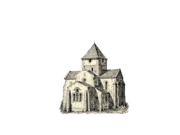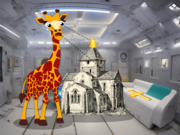古体诗
Characters and words in 古体诗
ancient / old / paleo-
古
=
十
+
口
:
Mnemonic symbol: at least on German maps, this character actually resembles a cloister.
Oh no! Gitta Giraffe (gu) found that the golden cross (十) broke off of the cloister (古) in the space station's living room (Ø3)! She skewers a mandarin (口) on top of the cloister so that she can skewer the broken off cross back on to fix it.
Oh no! Gitta Giraffe (gu) found that the golden cross (十) broke off of the cloister (古) in the space station's living room (Ø3)! She skewers a mandarin (口) on top of the cloister so that she can skewer the broken off cross back on to fix it.
body / form / style / system / substance / to experience / aspect (linguistics)
poem / CL:首[shou3] / poetry / verse
诗
=
寺
+
讠
:
Just in front of the space station (Ø1)
Sherlock Holmes (sh) suffers a head lesion
By bumping his head on a Buddhist shrine (寺).
"Don't you drink anymore wine!"
Is written on an advertisement pole (讠):
"Better follow our Buddha's role!"
"How can drinking wine be a crime?"
Sherlock, rubbing his head, has to whine.
"I shall return back to my home,
I'm already annoyed by this little poem. (诗)"
Sherlock Holmes (sh) suffers a head lesion
By bumping his head on a Buddhist shrine (寺).
"Don't you drink anymore wine!"
Is written on an advertisement pole (讠):
"Better follow our Buddha's role!"
"How can drinking wine be a crime?"
Sherlock, rubbing his head, has to whine.
"I shall return back to my home,
I'm already annoyed by this little poem. (诗)"
Words with 古体诗
古体诗
is not used as a component in another word.
Sentences with 古体诗
古体诗 currently does not appear in any sentence.


